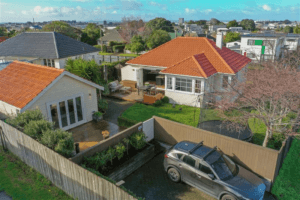Residential Property Investment Post Covid 19 – Directors Market Commentary

Two months ago NZ’s property market was on its way to posting record high house price growth. And then Covid came. While we navigate the property market through these extraordinary and uncertain times – there is one thing that is not new in times of crisis, and that is the speed by which the media and economists move to declare the fate of the property market. Little of which provides much perspective.
NZ is tracking well in its Covid recovery, and is still a sound and attractive place to invest. The question then, is should I buy now or should I wait a few months? Will the market be better? Will prices be lower? If I wait, will I get a bargain?
I like to ask clients at times like this – if you’re waiting, what exactly are you waiting for? And will you know when it has arrived? Today you think you might know, but over the next few weeks the dynamics will change. During the GFC, I bought a property in Otahuhu, Auckland for $340K. It’s now worth approx. $800K. Should I have waited a few extra months?
While I don’t want to undermine the dynamics of Covid by comparing it to the GFC – they are different, but there are also some similarities and perspective to be gained from looking back. The property market is gearing up post lockdown. Here are a few things worth considering in deciding when to invest:
- Assuming you want to wait to find an opportunity to buy below market value, what do you truly hope to achieve? If you are a long term investor, looking to generate capital growth, you may not achieve what you set out to do. At times like this, we run the risk of focusing more on the deal, than on the property. Different property types have different capital growth potential. In times of crisis, bargain opportunities often go with properties that are not as saleable, usually due to quality or over supply. (e.g.: apartments, spec developments). What may seem like a real deal in the outset, may not translate to optimum capital growth. Let’s say you pay $900K for such a property, that was worth $1M in a pre-covid market, giving a saving of $100k. If that property’s average capital growth rate over the next 7 years is 5%, the property will be worth $1.366 at year 7. (with your $100K added back). Alternatively, if you paid $1M representing fair market value for a better type of property, with an average capital growth rate of only 1% more – at 6%, your investment will be worth $1.503M. Even on a very conservative comparison, you are $137K better off. Opportunism in property can be a double-edged sword! It is important, that we invest intelligently – to a defined goal, with the long term in mind, and resist getting distracted by quick gains.
- If you’re thinking prices will dip lower in a few months’ time, perhaps when wage subsidies run out and a few more businesses have gone belly up, then how much lower will they be? Price drop predictions during the GFC reached up to 30% – which ended up very wrong. If we look back to the GFC, sales volumes dropped from record volumes almost overnight – to less than half. But the median sale price continued to rise for 5 months after the crash, and only dropped by 3.6% in the 12 months following. During the GFC period itself, the market ebbed and flowed half a dozen times. None of this was predicted. If you’re going to wait to buy when prices are at their lowest, you will need to know when they’ve reached that point, and how will you know? Trying to forecast the bottom of the market can be futile. A volume of bank forced sales in the market will create downward pressure on pricing, can be an influencer but the question is, will we see lots of them post Covid? Compared to the GFC, we have record low interest rates, lower loan to value ratios (LVR’s), household/business debt consumption is now less than half what it was in 2007. Property owners are not as leveraged to the same degree. And unlike the GFC, banks are supporting clients and their businesses through this time.
- It became very evident through the GFC that while the media was reporting price declines across the board for property, in fact different sections of the market were performing quite differently. The lower end of the market that attracted investors saw a mass liquidation, while quality properties in higher price points continued to hold their value. As in any downturn, the same will happen here. There will be sections of the market that will be more vulnerable, but quality properties that are very saleable will fare much better.
There is still much to play out on how the economy and property market will travel in the next few months. How soon will domestic travel be up and running to boost the economy? will the government extend wage subsidies for tourism? where will the unemployment rate land? when will our borders open again for migration? On the upside the property market went into Covid with guns blazing, there is significant government support for jobs/businesses, debt is as cheap as it’s ever been, and NZ does not have an oversupply of housing. The housing market has remained as active as it could under lockdown. Many properties sold during lockdown have sold under competition and for good money. While the country rallies from Covid, life will still go on. People will continue to buy and sell – people will still want to upsize and downsize.
Now as much as ever, we should stay focused on the equity we need to create from our property portfolios. Can I encourage you to keep actioning your property investment plan. If you have a specific property search brief, keep with it. It will ensure, you buy quality property that keeps you on track to best achieve your financial goals. And again…if you are choosing to wait can you answer the questions – do you know what you’re waiting for? Will you know when it has arrived?
